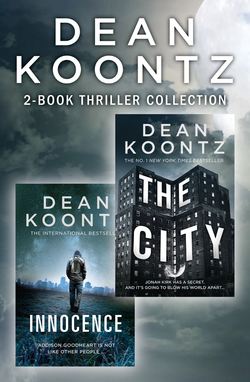Читать книгу Dean Koontz 2-Book Thriller Collection: Innocence, The City - Dean Koontz, Dean Koontz - Страница 48
Thirty-six
ОглавлениеFATHER DIED ON A NIGHT DRAPED WITH HEAVY snow. The streets were all but impassable because of a strike of city workers in the Street and Sanitation Department that a cowed mayor would not confront. No plows funneled the powder to the curbs, and no dump trucks stood by to be loaded. Because the storm came rich in snow but without wind, perfectly even layers built up on every horizontal surface, as smooth as buttercream. The tunnel visors on the traffic lights wore white hoods, under which burned cyclops eyes that, when not blind dark, were red or green or yellow. The only vehicles abroad—a couple of four-wheel-drive black-and-white SUVs with police shields on the doors and a winterized ambulance of similar design—ignored those signals and cruised intersections without stopping.
We had read of the predicted storm in the newspaper, during our after-hours visit to the library, and we had prepared for a night of sightseeing enhanced by the magical quality of a city under a spell of snow. Warmly dressed beneath our fleece-lined raincoats, booted and gloved and wearing ski masks, our hoods up and tied beneath our chins, we came aboveground in high spirits.
During the first hour of our tour, we saw many marvelous things, one particularly memorable as we entered the block where stood the great Cathedral of St. Saturnius of Toulouse. The church and its associated buildings occupied an entire block at the broad flat top of Cathedral Hill, with steps plateauing up to its three entrances, each with two bronze-clad doors under a cinquefoil arch. The two Gothic towers soared so high into the night that their spires at moments disappeared into the kaleidoscopic snowfall.
Along the street came a sleigh drawn by a horse nearly as large as a Clydesdale. The snow-muffled clopping of its steel-shod hooves and the ringing of the bells on its harness signified its reality, which otherwise we might have questioned, so fantastic was the animal and the four-passenger cariole that it pulled. A couple occupied the front seat, another couple the back, and they were dressed as if out of Dickens: the women in bonnets and voluminous dresses overlaid with capes, their hands warmed in furry mufflers; the men in greatcoats and top hats, bright scarves around their necks. We thought they must have planned this a long time, as a lark, and it tickled us to think that people would go to such lengths for the sake of frivolity. We waved at them, and they waved at us, and they turned west along the brow of Cathedral Hill.
Inspired by that sight, Father and I broke into a snowball fight in the middle of the street, half a block past the church. We were thus engaged, plumes of laughter feathering away in the icy air, when the police SUV turned the corner and angled toward us.
Perhaps the two patrolmen wanted only to warn us not to continue our game in the middle of the street, although traffic was almost as light as it might be after doomsday. Or perhaps they might have been concerned that we would damage one of the vehicles parked at the curb, inadvertently scooping up a chunk of tarred gravel from a fracture in the blacktop, giving one of our snowballs windshield-cracking impact.
We waved at them to indicate that we understood their concern, and we stepped between two parked cars to the sidewalk, continuing north. But waving and cheerful assent to their authority didn’t satisfy them. They swung the SUV around to follow us and, with a spotlight, brought us center stage in the night.
Over a loudspeaker, one of them said, “Please stop right there.”
When my mother had turned me out, my life had rolled down the long hill of change, but I had enjoyed a better and more stable life during the twelve years after Father saved me from burning. What happened in the next few minutes, however, seemed not like a hill of change but like a cliff from which I was pushed into darkness. I will never be able to recount it without pain.
